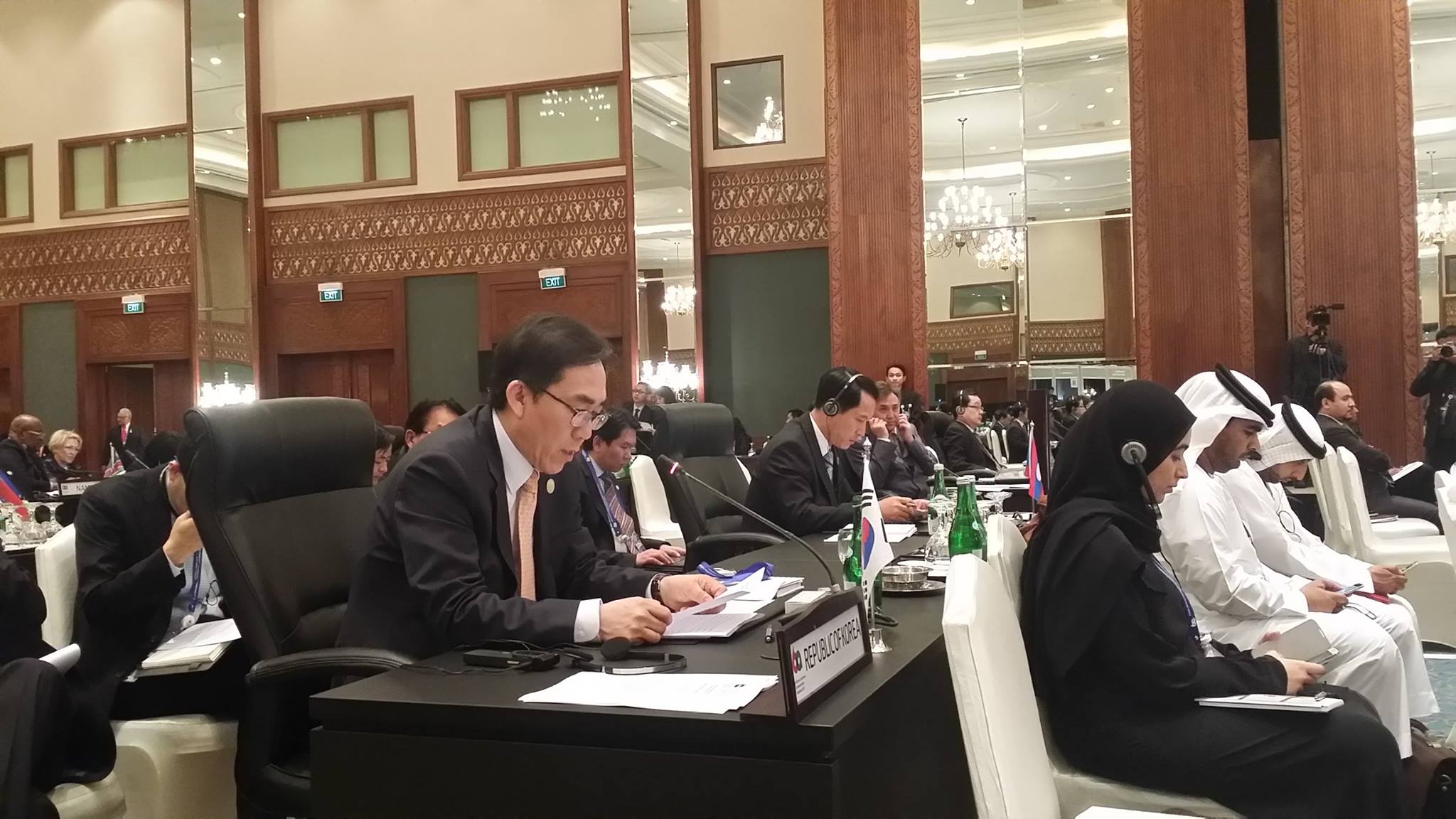1,2차관
제2차관, 반둥회의 60주년 기념 각료회의 연설문(4. 20.)
- 부서명
- 작성자
- 작성일
- 2015-04-21
- 조회수
- 5372

Statement
by H.E. Cho Tae-yul
Vice Foreign Minister of the Republic of Korea
at the Ministerial Conference
in Commemoration of
the 60th Anniversary of the 1955 Bandung Conference
April 20, 2015
Jakarta, Indonesia
Mme. President,
Sixty years ago, the leaders of 29 countries gathered in Bandung to participate in the First Asia-Africa Summit and the Ten Principles of Bandung were declared in an effort to establish a new international order. These principles represent their vision for a world where “the voice of reason” could be heard on international affairs, as then President Sukarno of Indonesia put it.
Indeed, amidst the vestiges of colonialism and in the face of the stark realities of the Cold War, the leaders of the newly independent countries in Asia and Africa decided to walk down the path of reason rather than a path of animosity arising from their struggle for independence. This Bandung Spirit developed into the Non-Aligned Movement in 1961.
It is true that the Non-Aligned Movement which aimed to break away from the Cold War structure lost some of its significance with the end of the Cold War in 1990. Moreover, due to the rapid development of globalization, the dazzling economic growth of some countries in Asia, and the resulting development gap among the developing countries, the Bandung Spirit and the Asian-African solidarity seemed to have somewhat withered.
However, the Bandung Spirit had been deeply ingrained in the foreign policies of Asia and Africa. The New Asian-African Strategic Partnership announced in 2005 was a resurrection of the Bandung Spirit calling for a collective response to the new challenges and for heightened cooperation between the two continents.
For the countries of Asia and Africa, the Bandung Spirit has provided a way forward in overcoming numerous challenges, while sailing through the Cold War and the post-Cold War periods and the tides of globalization and regional integration.
The Bandung Spirit contributed to raising the awareness that poverty, famine and the deprivation of socio-economic opportunities in the Third World were not problems of any one nation or region, but rather a common problem faced by the global community.
The Bandung Spirit has also served as a catalyst for enhancing connectivity and integration in Asia and Africa. A number of initiatives are now underway with the aim of strengthening connectivity within the region and between the two continents.
Now is the time for us to build upon the achievements made since the 1955 Bandung Conference and prepare for the next 60 years. For Asia and Africa to grow and prosper together, the following three points are in order.
First, Asia and Africa must take the lead in ending the past history of division and conflict and thereby contribute to building a permanent structure of peace and cooperation across the globe.
Only when the “security dilemma” has been resolved through the enhancement of mutual trust, will we be able to pave the road towards the establishment of true peace and prosperity.
The Trustpolitik of the government of the Republic of Korea is based on this belief. The Republic of Korea’s efforts to dismantle the current structure of distrust in the Korean Peninsula and Northeast Asia will contribute to building a mechanism for greater region-wide security cooperation, which in turn will hopefully lend impetus for cooperation with Africa as well.
Second, a foundation for co-prosperity must be established by increasing connectivity in the region. Bridging the gap between countries of the region is an urgent task necessary for building a prosperous Asia and Africa.
The ASEAN realized early on that bridging development gaps and increasing connectivity are the greatest challenges in building an ASEAN Community and has invested much efforts and resources in this regard. Such efforts to enhance physical, institutional and people-to-people connectivity must be devoted on a larger scale throughout Asia and Africa.
As an emerging FTA hub in Asia, the Republic of Korea will actively contribute to increasing regional connectivity as well as trade and investment liberalization by taking the lead in expanding the regional FTA networks.
In addition, the Republic of Korea will step up its efforts to strengthen cooperation with countries of Asia and Africa, fully making use of existing mechanisms such as the Korea-Africa Forum and the Korea-ASEAN Cooperation Fund.
Third, Asia and Africa must lead the growth of the global economy by continuously creating a new engine of growth and strengthening the South-South Cooperation to share development experiences and lessons learned.
While the economy of the developed countries has been faltering in recent years, the developing countries of Asia and Africa have been enjoying remarkable growth. In particular, Africa is the fastest growing continent in the world.
In order for Asia and Africa to sustain its current growth, it is necessary to establish good governance, effective institutions and sound national development strategies as well as domestic environments friendly to foreign investment and trade.
The Republic of Korea can be a perfect cooperation partner for the developing countries in Asia and Africa towards this end, as we know better than any other country the constraints and bottlenecks lying in their quest for prosperity. Currently, 80% of Korea’s foreign aid goes to Asia and Africa.
The Republic of Korea will continue to provide assistance for the Asian and African countries in their road towards sustainable development. In doing so, focus will be placed on their capacity-building. By sharing our success as well as failure stories, we will remain a source of hope and inspiration for the countries of Asia and Africa.
Mme. President,
With all the efforts of the past 60 years, the face of today’s world is a far cry from what the leaders of the 1st Bandung Conference envisioned. The horrors we are witnessing in Syria and Iraq bitterly show that the world we live in is not a world in which the “voice of reason” is listened to.
However, the Bandung Spirit lives on. To create a world in which human dignity and democratic values are fully respected, we must uphold the Bandung Spirit. I hope that today’s conference will mark another milestone in Asian-African cooperation by renewing our commitment to usher in the next 60 years of opportunity and hope.
As a trusted partner, friend, and supporter of Asia and Africa, the Republic of Korea is committed to walking that path together.
Thank you. /End/
-------------------------------------(비공식 국문 번역본)-------------------------------------
반둥회의 60주년 기념 아시아-아프리카 각료회의 연설문
2015.4.20
의장,
60년 전 29개국의 지도자들은 제1차 아시아-아프리카 정상회의에 참석하기 위해 반둥에 모였습니다. 바로 그 자리에서 새로운 국제질서를 확립하기위한 노력의 일환으로 ‘반둥 10원칙’이 선포되었습니다. 이 원칙들은 당시 인도네시아 수카르노 대통령의 표현을 빌리자면 국제문제에 관해 ‘이성의 목소리’를 들을 수 있는 세계를 만들기 위한 지도자들의 비전을 보여주는 것입니다.
식민주의의 잔재가 여전히 남아 있는 상황하에서, 그리고 냉전이라는 냉혹한 현실에 직면하여, 아시아와 아프리카의 신생독립국 지도자들은 독립을 쟁취하는 과정에서 생겨난 반목의 길이 아닌, 이성이 인도하는 길을 걷기로 결정한 것입니다. 이러한 반둥정신은 1961년의 비동맹 운동으로 이어졌습니다.
냉전구조에서 탈피하기 위해 출범한 비동맹 운동은 1990년 냉전이 종식되면서 그 의미가 다소 퇴색된 것이 사실입니다. 더욱이, 세계화가 급속히 진전되는 과정에서 일부 아시아 국가들이 눈부신 경제성장을 이루었고, 그에 따라 개발도상국들 가운데에서도 개발의 격차가 생겨나면서 반둥정신과 아시아-아프리카의 연대도 다소 약화되는 것처럼 보였습니다.
그러나 반둥정신은 이미 아시아와 아프리카 국가들의 대외정책에 깊이 뿌리를 내리고 있었습니다. 2005년에 발표된 "아시아-아프리카 신전략 파트너쉽"은 새로운 도전과제들에 공동 대응하고 양 대륙간 협력을 한층 더 강화할 것을 촉구하는 반둥정신의 부활이었습니다.
아시아-아프리카 국가들에게 반둥정신은 냉전시대와 탈냉전시대를 거쳐 세계화와 지역통합이라는 급류를 헤쳐 나가는 과정에서 수많은 도전을 극복하고 앞으로 항해해 나갈 수 있게 해 준 길잡이 역할을 하였습니다.
반둥정신은 제3세계의 빈곤과 기아, 그리고 사회·경제적 기회박탈이 어느 특정 국가나 지역의 문제가 아닌, 지구촌이 당면한 공동의 문제라는 인식을 확산시키는데 기여하였습니다.
반둥정신은 또한 아시아-아프리카의 연계성과 역내 통합을 증진하는 촉매제 역할을 해 왔습니다. 현재 아시아-아프리카에서는 역내에서, 그리고 양 대륙간에 연계성을 강화하기 위한 많은 이니셔티브들이 추진되고 있습니다.
지금은 1955년 반둥회의부터 현재까지 이루어낸 성과를 바탕으로 다가오는 60년을 준비해야 할 때입니다. 아시아와 아프리카가 함께 성장하고 번영하기 위해서는 다음 세 가지 사항이 중요합니다.
먼저, 아시아와 아프리카는 분열과 갈등의 역사를 종식시키고 이를 통해 지구촌에 평화와 협력의 항구적 구조를 구축하기 위한 노력에 앞장서야 합니다.
상호 신뢰를 두텁게 쌓아 '안보딜레마'를 해결할 수 있을 때 비로소 진정한 평화와 번영으로 나아갈 수 있을 것입니다.
우리 정부가 추구하고 있는 '신뢰외교'는 바로 이러한 믿음에서 출발한 것입니다. 오늘날 한반도와 동북아 지역의 불신의 구조를 타파하고자 하는 우리 정부의 노력은 보다 광역 차원의 안보협력 메커니즘을 구축하는데 기여할 것이며, 이는 아시아를 넘어 아프리카와의 협력으로도 이어질 수 있을 것입니다.
두 번째로, 역내 연계성 증진을 통해 공영의 기틀을 마련해야 합니다. 역내 국가들간 격차 해소는 번영하는 아시아와 아프리카를 이루어 내기 위해 시급한 과제입니다.
아세안은 역내 개발 격차 해소와 연계성 증진이 ASEAN 공동체 출범에 있어 가장 큰 도전과제라는 점을 일찌감치 인식하고 이러한 관점에서 각별한 노력과 자원을 투입해왔습니다. 물리적, 제도적, 인적 연계성을 증진하기 위한 이러한 노력은 전 아시아-아프리카 차원에서 더 광범위한 규모로 추진되어야 할 것입니다.
한국은 아시아의 떠오르는 FTA 허브로서 역내 FTA 네트워크를 확장시키는데 주도적인 역할을 함으로써 무역·투자 자유화뿐만 아니라 역내 연계성 강화에도 적극 기여하고자 합니다.
아울러, 한-아프리카 포럼, 한-ASEAN 협력기금 등 기존의 협력 메커니즘을 최대한 활용하여 아시아-아프리카 국가들과의 협력을 증진시키기 위한 노력을 더욱 강화해 나갈 것입니다.
세번째로, 아시아와 아프리카는 새로운 성장동력을 지속적으로 창출하고 남남협력 강화를 통해 개발 경험과 교훈을 공유함으로써 세계경제 성장을 견인해 나가야 합니다.
최근 선진국 경제는 주춤하고 있는 반면, 아시아와 아프리카 개도국은 괄목할 만한 성장을 누리고 있습니다. 특히 아프리카는 세계에서 가장 빠르게 성장하고 있는 대륙입니다.
아시아-아프리카가 현재의 성장을 지속해 나가기 위해서는 선정(good governance)과 효율적인 제도, 건전한 국가발전전략의 수립뿐만 아니라 외국인 투자와 대외무역에 친화적인 국내 환경이 정비되어야 합니다.
한국은 아시아와 아프리카 개도국들이 이러한 목표를 향해 나아가는데 완벽한 협력파트너가 될 수 있습니다. 왜냐하면 한국은 아시아와 아프리카의 개도국들이 번영으로 나아가는 과정에서 겪게 될 제약과 걸림돌들을 다른 어느 나라들보다 더 잘 알고 있기 때문입니다. 현재 우리 대외원조의 80%는 아시아-아프리카에 지원되고 있습니다.
우리는 아시아-아프리카 국가들이 지속가능한 발전을 향해 나아갈 수 있도록 앞으로도 이러한 지원을 계속해 나갈 것입니다. 그 과정에서 무엇보다도 아시아-아프리카 국가들의 역량강화에 집중적인 노력을 기울여 나가고자 합니다. 우리의 성공담과 실패담을 함께 공유함으로써 아시아-아프리카 국가들에게 희망과 영감의 원천으로 계속 남아 있고자 합니다.
의장,
지난 60년간의 노력에도 불구하고 지금 지구촌의 모습은 제1차 반둥회의를 이끌었던 지도자들이 꿈꾸었던 세상과는 거리가 멉니다. 시리아와 이라크에서 목격되는 참상은 우리가 살고 있는 세상이 ‘이성의 목소리’를 들을 수 있는 세상이 아님을 쓰라리게 보여주고 있습니다.
그러나, 반둥정신은 아직 살아있습니다. 인간의 존엄성과 민주주의적 가치들이 온전히 존중받는 세상을 만들기 위해서는 반둥정신을 더욱 굳건히 지켜나가야 합니다. 금번 회의가 기회와 희망의 새로운 60년을 열어나가기 위한 의지를 새로이 함으로써 아시아-아프리카 협력에 있어 또 하나의 이정표가 되기를 기대합니다.
한국은 아시아-아프리카의 신뢰받는 파트너로서, 친구이자 후원자로서, 그 길을 함께 걸어가고자 합니다.
감사합니다. 끝
